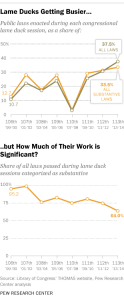
Late last year, the Pew Research Center released a major survey on religion in 18 Latin American countries and the U.S. territory of Puerto Rico, finding that many Latin Americans are leaving Catholicism and joining evangelical Protestant churches.
Fact Tank sat down with Neha Sahgal, one of the study’s lead researchers, to learn more about how Pew Research was able to reach these conclusions:
In general, how do you manage to determine whether people have converted from one faith tradition to another?
The Pew Research Center routinely conducts surveys that, among other topics, address religious conversion. Typically, we do not ask respondents if they have changed their religious faith, because people may answer this question in different ways. For example, to one respondent, switching from Catholicism to Protestantism may constitute changing their faith, while to another it may not. Instead, in the Latin America survey, we asked all respondents about their current religion, and we also asked them how they were raised as a child. When childhood religion differed from current religion – for example, someone who said that he or she is currently Protestant but was raised Catholic – we considered this an instance of “religious switching.”
This approach captured substantial levels of religious switching in Latin America – in nearly every country surveyed, the Catholic Church has experienced net losses.
How did you assess people’s reasons for switching faith?
Respondents who were raised Catholic but are no longer Catholic – the largest group of converts in the region – were asked additional questions about when and why they left the church. We asked former Catholics to rate eight possible reasons for switching faiths – these included seeking a personal connection with God, outreach by a new church and marriage to a non-Catholic. These respondents rated each reason as “important” or “not important” for why they are no longer Catholic. To gain further information about the circumstances surrounding religious conversion, we also asked respondents how old they were when they left Catholicism and how often they were attending Mass around the time they left the Catholic Church.
Among former Catholics who are now Protestant, the most cited reason for leaving the Catholic faith was “seeking a more personal connection with God.” Many former Catholics also said they became Protestant because they wanted a different style of worship or a church that helps its members more.
Protestant identity is often difficult to measure because there are so many different Protestant churches and denominations. How did you account for this in Latin America?
In the United States, the terms “evangelical” or “born again” refer to a specific group of Protestants known for their especially high level of religious commitment and belief in the infallibility of the Bible. In Latin America, however, the terms “Protestant” and “evangelical” are often used interchangeably. So in the survey questionnaire we offered “Protestant or evangelical” as an option when asking people about their religious identity. Other options for this question included Catholic, Mormon, Jehovah’s Witness, Afro-Caribbean religion, atheist, agnostic or no particular religion. Those who identified themselves as “Protestant or evangelical” were then asked if they belong to a historically Protestant denomination, such as Baptist, Methodist or Lutheran; a Pentecostal denomination, such as Assemblies of God; or another Protestant denomination.
We found that fewer than a quarter of Protestants in most countries in the survey identified as historical or mainline Protestants, while about half said that they are Pentecostal.
When it comes to topics like religious affiliation or conversion, it is clear that you are asking a lot of questions. How long was a typical interview for the Latin American survey?
Interviews averaged about 45 minutes in duration, which is extremely long when compared with a typical telephone survey in the United States. But keep in mind that the survey in Latin America was administered face-to-face. Although more expensive and sometimes logistically challenging, in-person interviews allow for the intensive, in-depth questioning required by our religion survey.
In each country, we relied on reputable, local research organizations to train and field interview teams to go door-to-door in assigned locations and randomly select individuals to participate in the survey. In general, we found most people to be interested and willing to talk about religion, including their religious affiliation, and in the case of former Catholics, the reasons they left the Catholic Church.
Were there concerns about the cultural sensitivity of certain questions?
Yes – we try to ask pertinent, important questions that can be compared across countries, while also ensuring that the questions are culturally sensitive in each place. Many of the questions included in this survey had been previously asked in Latin American countries by Pew Research Center’s Global Attitudes Project. These are tried and proven questions that we know work well for cross-national comparisons. We also repeated some questions previously asked in our survey on religion among U.S. Hispanics. Given cultural similarities between U.S. Latinos and Latin Americans, we were confident that these questions would work again.
We also pre-tested the questionnaire prior to conducting the full survey. That is, we asked interviewers to test a draft questionnaire with about 20 respondents in each country and give us extensive feedback on the flow of the interview. We modified questions that the interviewers identified as potentially offensive or not relevant.

